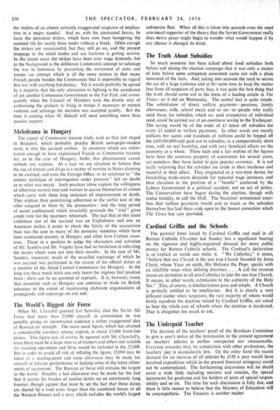The Truth About Subsidies
So much nonsense has been talked about food subsidies both before and during the election campaign that it was only a matter of time before some competent economist came out with a plain statement of the facts. And, taking into account .the need to secure the ear of a large audience and at tint same time to keep the matter free from all suspicion of party bias, it was quite the best thing that the truth should come out in the form of a leading article in The Times—as it did on Wednesday. The central fact is quite simple. The substitution of direct welfare payments—pensions, family allowances, milk, school meals and so on—to people who really need them; for subsidies, which ar,.: paid irrespective of individual need, could be carried out at an enormous saving to the Exchequer. The saving would be of the order of £3 taken off subsidies for every fl added to welfare payments. In other words not merely millions but scores and hundreds of millions could be lopped off the £400,000,000-odd paid out in subsidies, in a .comparatively short time, with no real hardship, and with very beneficial effects on the economy as a whole. These facts and a fair outline of the figures have been the common property of economists for several years, yet somehow they have failed to gain popular currency. It is not really surprising that the subsidies are crude in their incidence and wasteful in their effect. They originated as a war-time device for forestalling trade-union demands for repeated wage increases, and their elevation to the position of a " benefit " conferred by the Labour Government is a political accident, not an act of policy. The Conservatives have begun during the election, though with undue timidity, to call the bluff. The Socialists' nonsensical asser- tion that welfare payments would cost as mucin as the subsidies themselves has laid them wide open to the honest correction which The Times has llow provided.


































 Previous page
Previous page